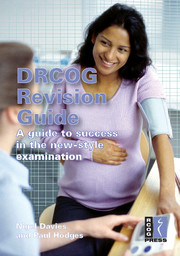Book contents
- Frontmatter
- Contents
- Foreword
- About the authors
- Acknowledgements
- Abbreviations
- 1 Introduction
- 2 The curriculum
- 3 Syllabus
- 4 The new DRCOG examination
- 5 Extended matching questions
- 6 EMQ paper one
- 7 EMQ paper two
- 8 Single best answer (best of five) questions
- 9 Single best answer paper one
- 10 Single best answer paper two
- 11 Multiple choice questions
- 12 MCQ paper one
- 13 MCQ paper two
- 14 Ten tips for candidates
- 15 Answers
- Mock examinations answer sheets (blank)
- Index
1 - Introduction
Published online by Cambridge University Press: 05 August 2014
- Frontmatter
- Contents
- Foreword
- About the authors
- Acknowledgements
- Abbreviations
- 1 Introduction
- 2 The curriculum
- 3 Syllabus
- 4 The new DRCOG examination
- 5 Extended matching questions
- 6 EMQ paper one
- 7 EMQ paper two
- 8 Single best answer (best of five) questions
- 9 Single best answer paper one
- 10 Single best answer paper two
- 11 Multiple choice questions
- 12 MCQ paper one
- 13 MCQ paper two
- 14 Ten tips for candidates
- 15 Answers
- Mock examinations answer sheets (blank)
- Index
Summary
The Diploma examination of the Royal College of Obstetricians and Gynaecologists (hereafter referred to by its common acronym: DRCOG) is designed for UK-based general practitioners (hereafter GP or GPs). Although suitable for supporting GPs' general medical knowledge and practice, the DRCOG is particularly useful for GPs wishing to offer obstetric, gynaecological and other aspects of women's healthcare in a primary healthcare setting, such as GP surgeries, walk-in centres and family-planning clinics. The DRCOG is not a mandatory qualification but it remains popular as evidence that Diplomates have an interest and some skill in the specialty. In addition, the DRCOG has a value in helping Diplomates to find good GP posts or partnerships. However, it must be emphasised that the DRCOG is not a specialist qualification and it is not relevant to competition for specialist training posts in obstetrics and gynaecology. More widely for the College, the DRCOG aims to support the College's core mission of ‘Setting standards to improve women's health’. It is of paramount importance that women and unborn babies receive accurate, sensitive and skilled care from their GPs. The DRCOG examination therefore plays a vital role in setting and maintaining standards in this key area of primary care.
- Type
- Chapter
- Information
- DRCOG Revision GuideA Guide to Success in the New-Style Examination, pp. 1 - 4Publisher: Cambridge University PressPrint publication year: 2008



